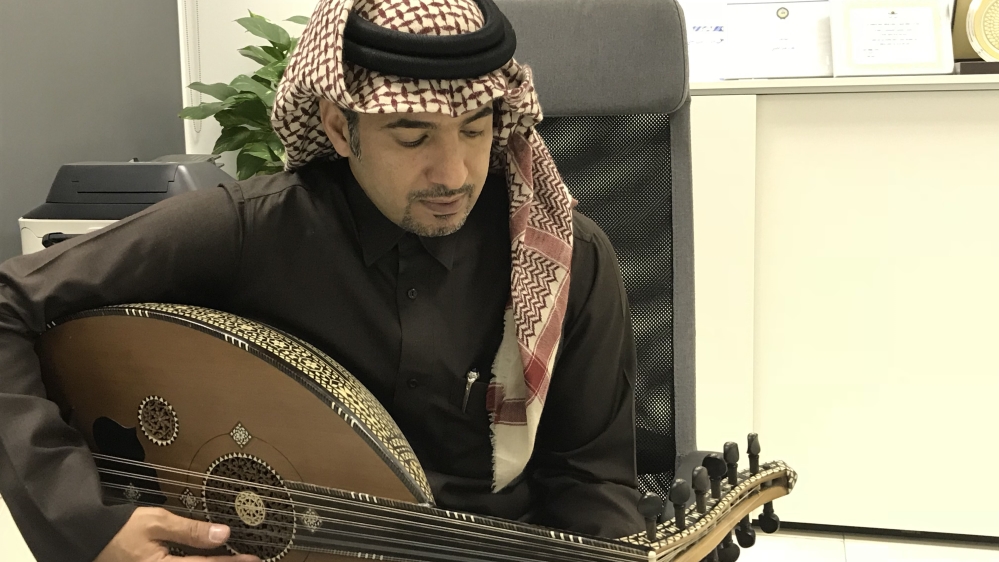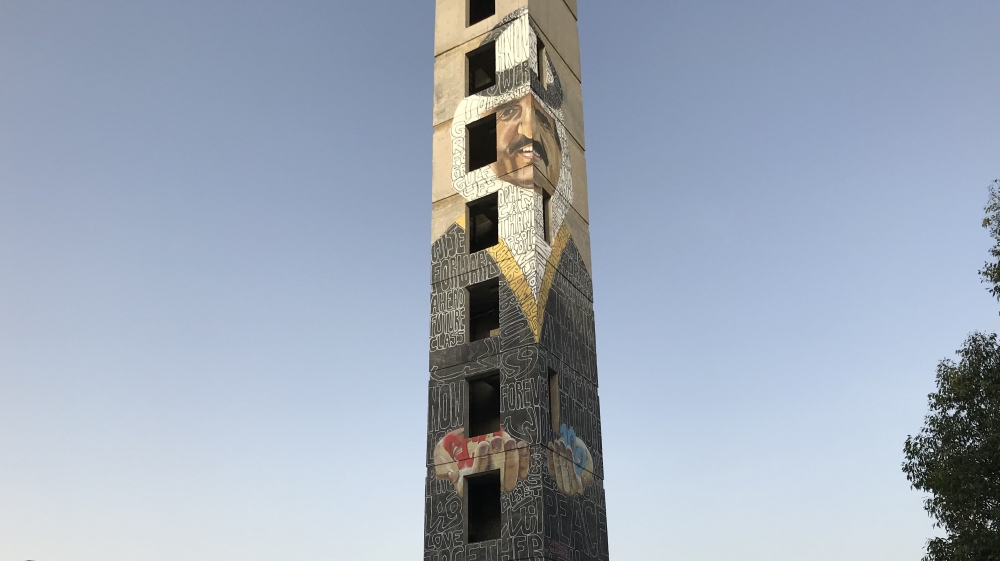Amid the Saudi-led blockade on Qatar, national youth used their artistic creativity in defending their country.
In his newly designed art studio in his bedroom, 31-year-old Qatari chemical engineer, Abdulhameed al-Siddiqi held his paint brush to draw a sketch of the country’s emir while adding a creative 3D touch using 14,750 pins.
Since June 5, 2017, Siddiqi along with many Qatari artists from the musical, fine arts and theatre fields have been inspired by the blockade crisis to use their artistic creativity in defending the Gulf nation and Emir Sheikh Tamim Al Thani.
Their main message was to reject the imposed siege by Saudi Arabia, United Arab Emirates and Bahrain, as well as Egypt.
For the first time, different artworks have been produced in large numbers around Doha.
There were billboards of local plays condemning the blockade in every traffic light stop, patriotic stickers on cars, artistic portrayals of the emir on towers, and even new national songs played in local radio stations and malls.
Siddiqi learned the basics of painting, types of colours, and art materials at a young age through Disney Channel explanatory programmes.
He stopped painting in 2009 because of his intense college work and the discouraging social trend back then, which used to be more focused on photography and graphic design and not painting. But upon the crisis, he revived his passion for art.
“I intentionally crashed a mirror and used its broken pieces to execute a meaningful artwork of Qatar’s map. The piece was about how the country crashed the siege and stood up again, stronger, more ambitious and committed,” he said.
Fine art before the crisis was more traditional-based and didn’t display a high level of provocation, said Michael Perrone, assistant professor in painting and printmaking at Virginia Commonwealth University in Qatar.
“During the crisis, the form of art was more communal. It was highly empowered and gave an interactive sense of loyalty to the emir from citizens and expatriates,” he said.
As for the theatre scene, only three plays were presented at Qatar National Theatre in the first half of 2017, according to the Theatre Affairs Center.
Unprecedentedly after the blockade, 16 plays have been presented with different genres so far. Some targeted children while others focused on expatriates, and there were plays that conveyed the Gulf crisis from a social perspective.
Ghanem al-Sulaiti, a prominent Qatari actor since 1979, director, writer, and consultant for the ministry of culture and sports, came back to the theatre scene after five years. His desire to discuss the Gulf crisis harshly through theatre was what triggered him to come back.
He took the lead in writing and directing the play Shelli Yeseer? (What is happening?), as well as acting in it.
The play starts with a sarcastic scene of a conspiratorial meeting taking place at a hotel room in Egypt by four men against Qatar: an Emirati, Saudi, Bahraini and an Egyptian.
Throughout the play, the plot unveiled and mocked various consequences of the siege and looked at how families in the Gulf have been deprived of visiting each other.
“I do not fear the reaction of patriotic people from the blockading countries even if things worked out again. I wrote the plot thoughtfully and used logical justifications to defend every attack the country received. All what I presented was the reality we lived,” he said.
Songs of solidarity
After anti-Qatar songs were released by singers from the blockading countries, many Qatari fans boycotted them. In fact, the blockade crisis turned up the volume on the local music scene.
Some of the lyrics of the anti-Qatar songs were: “Tell Qatar and whoever is behind it that this country [Saudi Arabia] has a long temper but if things turned out risky, it [Qatar] will see what our men will do.”
Eisa al-Kubaisi, one of Qatari singers, said the Gulf crisis rebuilt trust between the Qatari audience and its singers.
“There was a minimal recognition toward Qatari music from the local audience because of the high consumption of other Gulf music, especially from Saudi Arabia,” Kubaisi said.
“Now, Qatari singers are even given more chances to be part of people’s private lives such as in weddings.”
 |
| Kubaisi says the blockade has rebuilt trust between the Qatari audience and singers [Nawal Faisal Aqeel/Al Jazeera] |
The crisis did not only serve the existing Qatari artists in the market, but also gave a boost to new talent to showcase their art in public, especially through social media.
Among them was Naif Abdullah, 30, a graduate of Curtin University in Australia and a creative designer at Al Jazeera Arabic. His hobbies include playing the piano and collecting musical instruments from each country he visits.
For Abdullah, although he used to preform covers of Western songs back in Australia, it was his first time to publish a song of his own in Qatar, which he named Deerat Al-Majd (The country of glory). He saw the crisis as a trigger to present his talent to society.
Abdullah used social media as his first platform to release his song. After going viral, Qatar’s Al-Rayyan TV channel, as well as Sawt Al-Khaleej (The Voice of the Gulf), a local radio station, picked it up. Administrators from shopping malls, too, asked for his permission to play it.
During the Gulf crisis, he saw a big difference between Qatari music and blockading countries’ music.
“Qatari music stood out as peaceful and mature since it only praised Qatar and the emir, while the blockading countries’ music appeared accusing and hateful as it directly targeted Qatar,” he said.
 |
| Amid the blockade, talented Qataris have showcased their art in public [Nawal Faisal Aqeel/Al Jazeera] |
The circumstances of the crisis alerted society about an important duty towards the country, which is responsibility, said the head of the theatre affairs centre at the ministry of culture and sports, Salah al-Mulla.
“Realistically speaking, the society was used to the comfortable lifestyle, which suddenly got threatened. Citizens felt themselves in need to work harder to maintain this kind of lifestyle,” he said.
For Mulla, anyone who hears about a country facing a blockade for almost year would think sympathetically.
“For the case of Qatar, art was part of a powerful society. That is why art appeared strong and powerful,” he said.


